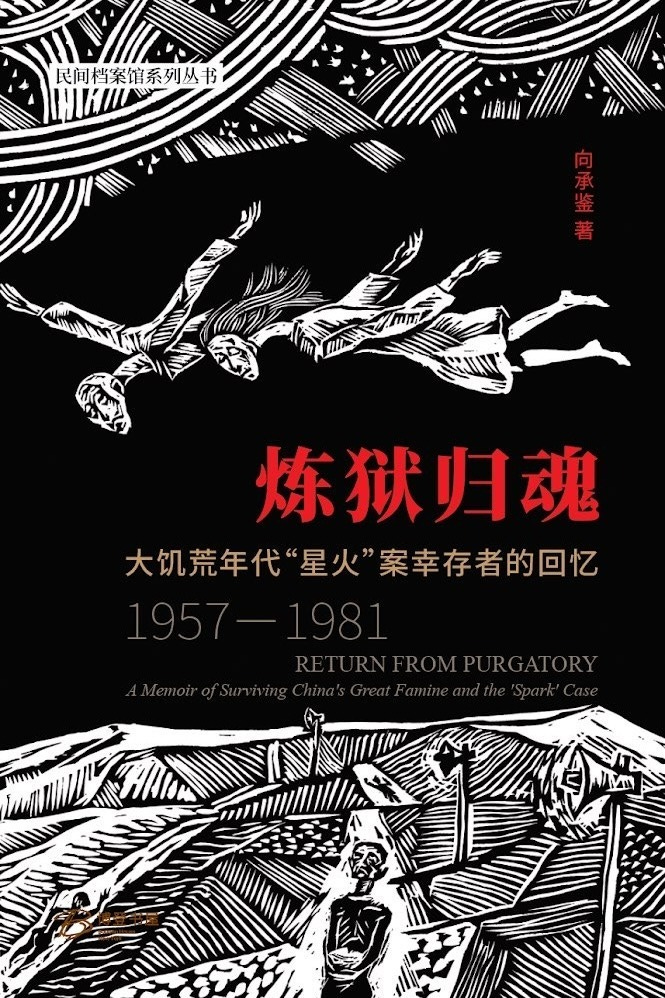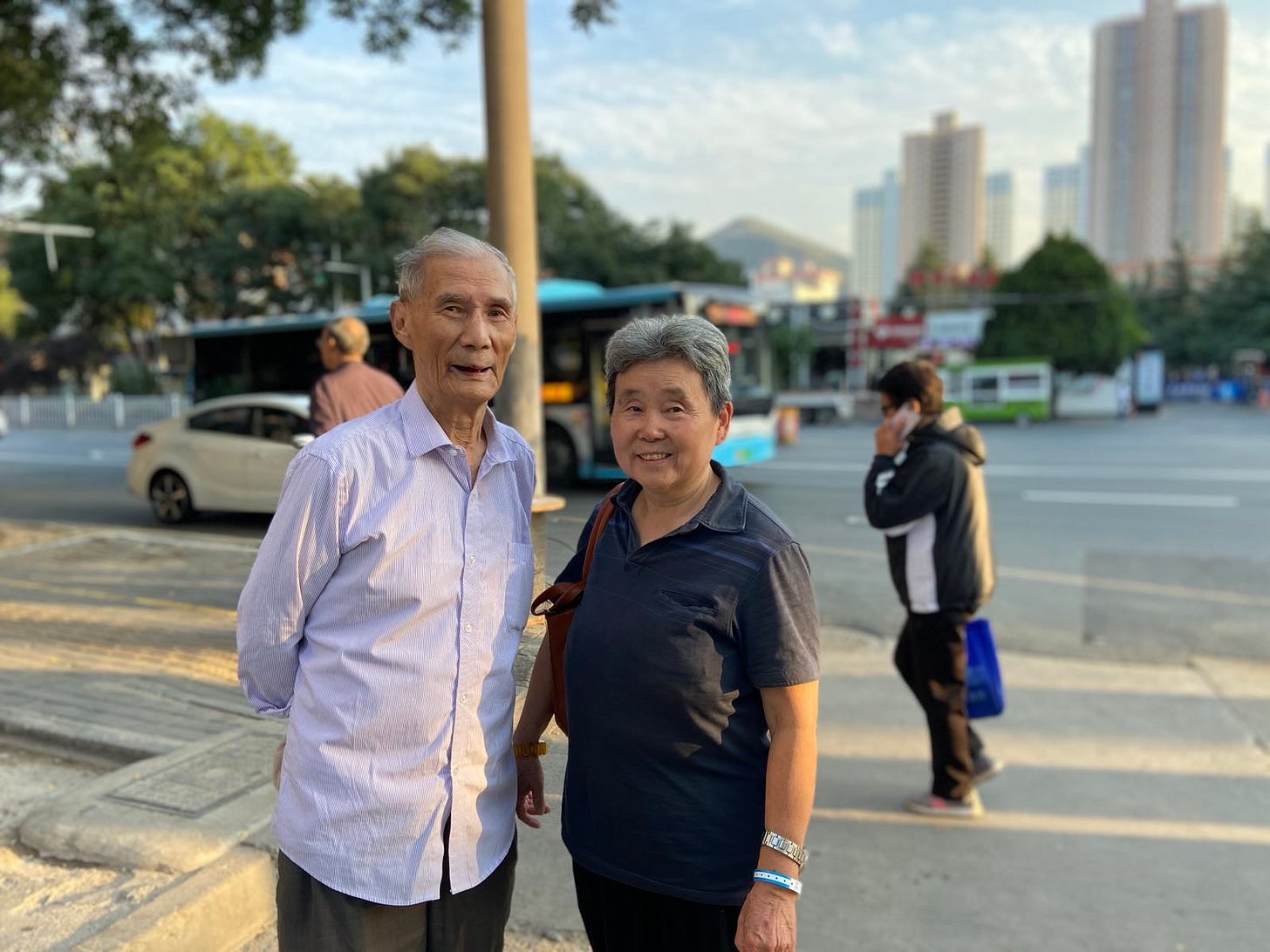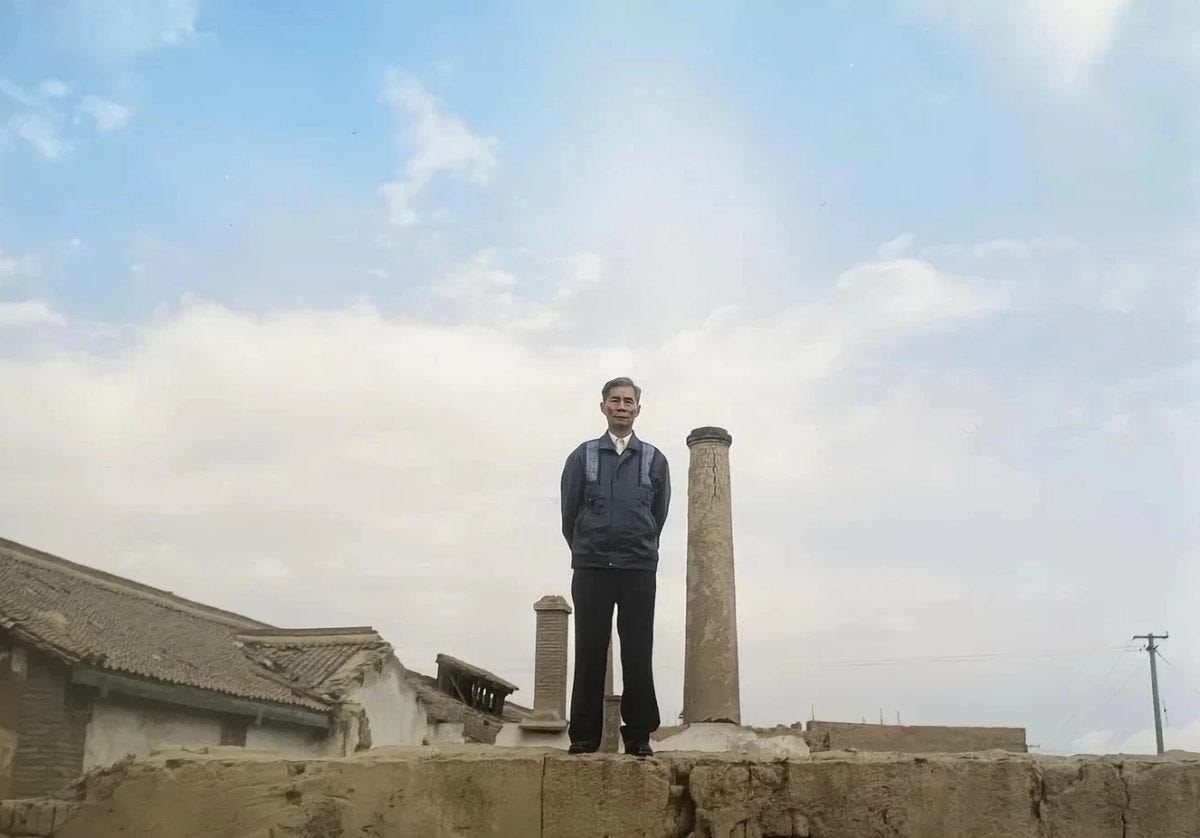那些未被杀死的,终将开口说话——向承鉴自传《炼狱归魂》获2024年博登书屋“最佳历史回忆文献档案奖”
The Unsilenced Will Eventually Have Their Say
作者:江雪
By Jiang Xue
The English translation follows below.
2024年3月,中国民间档案馆系列丛书的第一部——“星火案”幸存者向承鉴先生的自传《炼狱归魂:大饥荒年代“星火”案幸存者的回忆(1957-1981)》,终于在纽约付诸印刷。厚厚一卷,550页,拿在手里沉甸甸的。书的封面采用了胡杰先生的木刻作品,黑白底色上,红色的书名十分醒目,提示人们,那是一段滴血的历史,且至今伤口未愈。
要感谢向承鉴先生,将“星火案”这样一个重要的历史事件,以个人经历为轴,完整地书写了下来。1996年从甘肃兰州的连城铝厂中学退休后,他回到故乡江西武宁的乡下,借了一处小屋开始写作。那年他65岁,头发还茂密。一笔一触,回望那段在“地狱”里熬炼、幸存并最终得以开口讲述的历史。
2016年早春3月,我去江西武宁向承鉴先生的家中拜望他,第一次看到了他这本回忆录的草稿。那是一种大开本、小方格的学生作文纸,很薄很软,高高一摞,蓝色的钢笔印迹已经有点变淡,但一笔一画,清晰有力,仿佛生命的力量都倾注在笔端。
自从2003年8月作者完笔,一直到今天,21年过去了,这本回忆录,辗转成为民间档案馆的系列丛书之一,并在纽约正式出版,还获得了2024年博登书屋颁发的“最佳历史回忆文献档案奖”,也算是一偿已85岁高龄的向先生的心愿。
1
2025年2月8日下午,纽约法拉盛。正值农历春节期间,博登书屋举办了年度图书的颁奖仪式。在获奖词中,学者胡平写道:“我们这代人所能留下的最有价值的文字,莫过于回忆录或自传。向承鉴这部五十万字的《炼狱归魂——大饥荒年代“星火”幸存者的回忆(1957-1981)》就是一个样本。”
当天的颁奖会上,还有其它一些优秀的图书获奖。而向先生的书,是面向历史深处的写作,是个人对历史重要时刻的宝贵见证,也是一个热爱自由与真理的人,以罕见的意志,面对极权不屈抗争的个人生命史。
农历元宵节那天,我给向先生打去电话报告这个好消息。没想到他住院了,病房里人多耳杂,夫人师凤枝扶他到卫生间里接电话。他看起来有一些憔悴,但听到书的消息,脸上还是浮起了温暖的笑意。
2003年8月,向承鉴正式完成了这本回忆录。随后,师凤枝帮他逐字输入电脑。那些年中国的言论氛围相对宽松,自传的内容也被上传到网上,香港中文大学图书馆的网站也收藏了回忆录。但如今香港的言论环境已今非昔比,这些内容也有被湮没审查的风险。2023年,非营利机构“中国民间档案馆”成立,决定筹资正式出版此书,并得到了纽约博登书屋的支持。
向承鉴的这本回忆录,从他自己的青少年时期写起,几乎涉及1949年后毛泽东时代每一个重要的历史阶段。向先生记忆力惊人,叙述能力强,作为一部回忆录,内容已相当完整丰富,但毕竟年代久远,其中个别地方有一些细小纰漏。鉴于此,艾晓明教授对全书内容作了全面的修订和校正。期间,她也和向承鉴做了很多交流。最后的书稿,收录了谭蝉雪当年录入整理的向承鉴为《星火》撰写的六篇文章,也收入了本人的“星火”系列报道之一《向承鉴:大饥荒让我们彻底清醒》。尤为重要的是,艾晓明还整理了一份向承鉴的平生年表。从他出生的1939年1月19日始至今,将他的生命历程和“星火”案的时间线清晰呈现出来。
艾晓明多年前就一直关注专门关押知识分子的夹边沟劳改营的幸存者,并拍摄了纪录片《夹边沟祭事》。独立导演胡杰早年拍摄《寻找林昭的灵魂》纪录片,以及后来拍摄《星火》,她都有长期关注。如今由艾晓明来做向先生这本自传的编辑,是最合适不过的事。
2
《星火》杂志诞生于大饥荒时期的大西北——甘肃天水,由当时下放到天水农村的兰州大学右派大学生张春元、顾雁创办,林昭的诗作曾在《星火》上发表。当时被下放在天水武山地区劳动的向承鉴,是《星火》最重要的参与者之一。
这本回忆录的最前面,是艾晓明的导论性文章:《黑暗时代的星火与幸存——读向承鉴回忆录〈炼狱归魂〉》。经由这个导论,读者更容易进入到这个“通往黑暗年代的历史隧道”。
回忆录分为三部分,对毛泽东时代每一场重要的政治运动都有详细的回忆。
在第一部分《正青春喋血时》中,作者回忆了自己如何在1957年被兰州大学打为右派,下放到天水劳动,以及如何目睹荒谬的“大跃进”、“人民公社”、“大炼钢铁”运动,并亲历大饥荒,每天目睹无辜生命的死亡,以及最终如何参与到地下杂志《星火》的创办中。
“反右”是向承鉴一生艰难命运的开端。正如艾晓明在导论中所说,“反右是 1949 年后第一次大规模的思想服从性训练”。这场训练的目的,是让中国的各级党政机构,以及各阶层的社会成员,都绝对服从于领袖的意志。而“唯有放弃思考,仅凭服从的忠诚,才能使政治运动得以一个战役接着一个战役地持续下去,从而保证党的意志上下畅通。”
向承鉴当时在兰州大学上学,全校教师和学生人数不过两千,就被划出“右派”近二百人,达到百分之十。可以说,反右,“通过言论入罪确立了思想文化上的专制,高等学府终于沦为一个背离理性、常识和逻辑的世界。”
但在如此荒诞、残酷的背景下,依然有人坚持着独立思考。在耳闻目睹大饥荒中农民遭受的苦难之后,兰州大学的“右派”学生,决定发出呼喊。当时的一些人,看到现状后,选择向最高当局呼吁。而顾雁、向承鉴等《星火》的撰稿者,则摒弃了这一不切实际的做法。如本书导论中所说:“他们明确认识到问题的根源,那就是政治制度的极权本质,它通向封建主义,通向法西斯纳粹的独裁政治。”
在第二部分《炼狱行》中,向承鉴详细回忆了自己因“星火案”被投入大牢,以“反革命罪”判刑18年,被辗转送到看守所、监狱以及劳改营服刑的经历,部分意义上描述出了中国的“古拉格集中营”的全景。他在青海的劳改营度过了十年,经历生命的极限,九死一生。1971年,正是文革期间,监狱里气氛十分紧张。一次,因为监狱里的报纸头版毛泽东的照片上,被烟头烫出了一个洞,他就面临着被指控“故意破坏领袖像”,随时可能被拉出去枪毙的命运。万幸,他躲过一劫,活了下来。
第三部分《归魂路》,记录了“文革”后,向承鉴与同案难友争取到全案平反,最终得获无罪判决的艰难过程。此后,作者才得以重建个人生活。
伴随着对一个荒谬绝伦年代的回忆,极权统治的本质也一一呈现。可以说,如此沉痛与深刻的回忆和记录,不仅属于苦难的中国人,也启发全世界热爱自由的人们,更深刻地反思与警惕极权主义的卷土重来。
3
2025年的这个春天,已经86岁高龄的向承鉴,在故乡江西武宁的家里,正与疾病和衰老抗衡。随着天气渐渐转暖,他也在缓慢康复。
已经出版的回忆录,依然很难送到他手中。虽然他当年经历的“反右”已过去了60多年,中国的经济与社会也已经有了巨大的发展和进步,但中国的言论管控始终存在,而且近十年来,越发严苛。
这或许也正是民间档案馆以及系列丛书的价值所在。
在《炼狱归魂》一书的前面,有一个总序言,讲述了中国民间档案馆希望出版系列丛书的愿望以及其意义。序言中讲道:
1949年以来,中共意识形态在中国始终占有绝对主导权,并对中国的当代历史书写产生了极大影响,官方一度控制了书写历史的绝对权力。但是,历史毕竟一直在演进之中,伴随着1976年“文革”的结束,以及随后的“改革开放”,官方的意识形态曾一度放松,中国人书写自己历史的环境也发生了变化。近40多年来,中国民间诞生了大量的历史书写,无论是档案的曝光,还是亲历者的自述,或是独立学者的历史研究成果。可以说,林林总总,蔚为大观,已经成为一个可堪瞩目的现象。
向承鉴先生正是这样的一个民间历史书写者。只因为说了真话,以及不愿意在极权政治造成的苦难面前沉默,他险些付出了自己的生命。而作为幸存者的他,最终不愿意沉默,提笔记录,开始为那些永远不能再发声的逝者讲话。
1990年代之后,随着电子技术的普及,以及适逢中国公民社会发展的一段宽松时期,中国民间产生了大量的历史书写,作者包括那些亲历了历史事件的普通人,以及有志于留存历史真相的媒体记者、学者、历史爱好者等各个群体。向承鉴先生就是其中的佼佼者。
这些珍贵的书写,往往都是从个人视角、普通公民的角度,超越意识形态,来反映真实的历史。其中一小部分已经出版,但更多的,因各种原因,尤其是言论审查的原因,在中国无法出版,而是以手稿、自印书等形式,流传民间。也有相当一部分,随着作者辞世而湮没无闻,就更让人痛惜和叹惋。
2025年3月全新升级的中国民间档案馆,正是以收藏、整理这些重要的民间历史书写为己任。它建立在互联网上,并以技术手段保证永远不被删除和修改。它希望能够记录下中国人民为恢复历史真相而所做的持之不懈的努力。
而系列丛书的目的,是希望让近年来中国“民间历史学家”们的卓绝努力,最终有一个物质的载体。这些历史的记录以纸质书的形式保留下来,除了告慰作者,也会被送往图书馆、研究机构,为后来者的研究奠定基础。
选择《炼狱归魂》这本回忆录作为丛书的开篇,正是向那些在追求自由民主的道路上筚路蓝缕、付出心血甚至生命代价的中国前辈致敬,也是希望在中国当下言论审查愈发严苛的背景下,积极开启“抢救历史”的下一段旅程。
是的,这是一段不能停息的旅途。从1990年代起“星火案”幸存者谭蝉雪努力写出《求索——兰州大学右派反革命集团案纪实》一书,到独立导演胡杰的寻访拍摄,到我和艾晓明等人的持续关注,以及今天《炼狱归魂》作为民间档案馆系列丛书的出版,这一切如同旅途中温暖的火苗,会打动人心,也会照亮历史的暗路。
2001年,在写《悼文十篇》(其内容后来都融入《炼狱归魂》一书中)时,向承鉴曾如是描述自己写作的心情:
“每当夜阑人静,我在伏案笔耕,或躺在床上。这时,死去的挚友便一个个走马灯似地来到我的面前,向我倾诉。他(她)们有的披头散发,有的满身血泪,有的肢体残缺不全,形骸皆不堪入目,使我片刻不得安宁。巴金老人写《随想录》半夜从床上滚下来打破台灯的经历,我亦感受过。
“我诅咒造化不把我变成一棵草、一块石;我甚至祈盼得一场大病,从此成为无记忆和思维的‘植物人’,从此解脱这无尽的痛苦与悲哀。”
如今,回忆录已完成并出版,而他的思考并未停止。除了《炼狱归魂》回忆录,向承鉴还在2000年完成了《马克思主义之异见与反思》一书,这是他对萦绕自己苦难一生的根源的追问。这本书注定在中国无法正式出版,所以在2014年由他自费印出。这个春天,向承鉴特意告诉我,他希望有更多的人看到这本书。而可堪告慰的是,读者们如今就可以在中国民间档案馆的网站上看到这又一本“自印书”。
本期推荐档案:
《炼狱归魂:大饥荒年代“星火”案幸存者的回忆(1957-1981)》
《星火》(胡杰导演的纪录片)
《星火》(大饥荒时期出版的地下刊物)
The Unsilenced Will Eventually Have Their Say
By Jiang Xue
In March 2024, the first volume of the China Unofficial Archives book series was published in New York: Xiang Chengjian’s autobiography, Return From Purgatory: A Memoir of Surviving China’s Great Famine and the ‘Spark’ Case. This weighty 550-page volume features a black and white woodcut print cover by Hu Jie, against which the red title stands out, a poignant reminder of a bloody history and unhealed wounds.
We owe a debt of gratitude to Mr. Xiang for his comprehensive personal account of the significant historical event known as the Sparks case. After retiring from Liancheng Aluminum Factory Middle School in Lanzhou, Gansu, in 1996, the then 65-year-old, still with a full head of hair, returned to his hometown in the countryside of Wuning, Jiangxi, and began writing in a borrowed small house. Each stroke of his pen was a look back at a history forged in the “hell” of that era, a survival story that ultimately found its voice.
In the spring of 2016, I visited Mr. Xiang at his home in Wuning, Jiangxi, and saw the draft of his memoir for the first time. It was a tall stack of large, thin, and soft student composition sheets with small squares. The blue ink had faded slightly, but each stroke remained clear and forceful, as if the very strength of his life had been poured into his writing.
Twenty-one years have passed since the author finished writing in August 2003. This memoir has journeyed through various stages to become part of the China Unofficial Archives series, culminating in its official publication in New York. It also received Bouden House New York’s “Best Historical Memoir and Documentary Archive Award” in 2024, a fitting tribute that fulfilled Mr. Xiang’s long-held wish at the age of 85.
1
On the afternoon of February 8, 2025, during the Lunar New Year, Bouden House held its annual book award ceremony in Flushing, New York. In his award citation, the scholar and commentator Hu Ping wrote, “The most valuable writings our generation can leave behind are memoirs and autobiographies. Mr. Xiang’s 500,000-character Return From Purgatory: A Memoir of Surviving China’s Great Famine and the ‘Spark’ Case serves as a prime example.”
Other excellent books also received awards at the ceremony. However, Mr. Xiang’s work stands out for being a profound exploration of history, a precious personal testament to a pivotal historical moment, and the life story of an individual who, with rare determination, resisted totalitarianism while cherishing freedom and truth.
On the Lantern Festival of the Lunar New Year, I called Mr. Xiang to share this good news. Unexpectedly, he was hospitalized. The ward was noisy, so his wife, Shi Fengzhi, helped him to the bathroom to take the call. He appeared somewhat frail, but a warm smile spread across his face upon hearing the news about the book’s award.
After Mr. Xiang finished his memoir in 2003, Shi had assisted him in typing it word by word into a computer. During those years, the speech environment in China was relatively open, and the couple had uploaded the autobiography online. The Chinese University of Hong Kong Library also archived the memoir online. However, the current atmosphere for free speech in Hong Kong has drastically changed, and this content now faces the risk of being suppressed and censored. In 2023, the non-profit organization China Unofficial Archives, newly established, raised funds for the book’s official publication, making it available in print and online.
Mr. Xiang’s memoir begins with his adolescence and covers nearly every significant historical period in China during the Mao era. Mr. Xiang possesses an extraordinary memory and a compelling narrative style. As a memoir, the content is remarkably comprehensive and rich, although some minor inaccuracies exist due to the passage of time. Recognizing these shortcomings, Professor Ai Xiaoming thoroughly edited the book. During this process, she also engaged in numerous discussions with Mr. Xiang.
The book includes the six articles Mr. Xiang wrote for the underground magazine Sparks, transcribed and compiled by Tan Chanxue at the time, as well as my report, “Xiang Chengjian: The Great Famine Made Us Completely Awake.” Crucially, Ai also compiled a chronological biography of Mr. Xiang, clearly outlining his life journey and the timeline of the Sparks case from his birth on January 19, 1939, to the present day.
Ai Xiaoming was a fitting choice for this task. She has made a long documentary about the Jiabiangou labor camp, which figures prominently in Mr. Xiang’s memoir. She has also followed the work of independent director Hu Jie, including the documentaries Searching for Lin Zhao’s Soul and Spark.
2
The magazine Sparks emerged from China’s Northwest, specifically the city of Tianshui in Gansu Province, during the Great Famine. It was founded by Zhang Chunyuan and Gu Yan, right-wing college students from Lanzhou University who had been exiled to Tianshui. Lin Zhao’s poetry was also published in Sparks. Mr. Xiang, who was then working in the Tianshui Wushan area, was a crucial contributor to Sparks.
The book begins with an insightful introductory essay by Professor Ai: “The Sparks and Survival of a Dark Age: Reading Xiang Chengjian’s Memoir Return From Purgatory.” This introduction takes readers into a “historical tunnel leading to the dark age.”
Mr. Xiang’s memoir has three parts, providing detailed recollections for every significant political movement in Maoist China.
The memoir is divided into three parts. In the first part, “The Time of Bleeding Youth,” Mr. Xiang recalls how he was labeled a Rightist by Lanzhou University in 1957 and sent to work in Tianshui. He witnessed the Great Leap Forward, the People’s Commune, and the Mass Steel Smelting campaigns, experiencing the Great Famine, witnessing the deaths of innocent people, and ultimately participating in the founding of the underground magazine Sparks.
The Anti-Rightist Campaign marked the beginning of Mr. Xiang’s arduous life. As Ai notes in her introduction, “The Anti-Rightist Campaign was the first large-scale training in ideological conformity after 1949.” The aim of this training was to ensure absolute obedience to the leader’s will from all levels of party and government organizations, as well as all social strata in China. “Only by abandoning thought and relying solely on obedient loyalty could political campaigns continue from one to the next, thereby guaranteeing the unimpeded flow of the party’s will from top to bottom.”
Mr. Xiang was a student at Lanzhou University at the time. With just over two thousand teachers and students in the entire university, nearly two hundred people, a staggering 10 percent, were classified as “Rightists.” It can be said that the Anti-Rightist Campaign “established ideological and cultural autocracy by criminalizing speech, and institutions of higher learning ultimately degenerated into a world that defied reason, common sense, and logic.”
Yet, even against this backdrop of absurdity and cruelty, some individuals persisted in independent thought. Having heard and witnessed the suffering of peasants during the Great Famine, the “Rightist” students at Lanzhou University resolved to speak out. Some at the time chose to appeal to the highest authorities after observing the situation. However, Mr. Xiang and other contributors to Sparks rejected this approach. As stated in the book’s introduction, “They clearly recognized the root of the problem as the totalitarian nature of the political system, which led to feudalism and fascist, dictatorial politics.”
In the second part, “Journey Through Purgatory,” Mr. Xiang vividly recounts his imprisonment due to the Sparks case. Sentenced to 18 years for “counter-revolutionary crimes,” he details his experiences being transferred between detention centers, prisons, and labor camps, offering a partial yet significant depiction of China’s gulag. He spent a decade in labor camps in Qinghai, enduring the limits of human existence and surviving numerous near-death experiences.
In 1971, during the height of the Cultural Revolution, the atmosphere in the prison was extremely tense. Once, because a cigarette burn marked the front-page photograph of Mao Zedong in the prison newspaper, he faced accusations of “deliberately damaging the portrait of the leader” and the imminent threat of execution. Fortunately, he narrowly escaped this fate and survived.
The third part, “The Road of Returning Soul,” chronicles the arduous process by which Mr. Xiang and his fellow defendants fought for and ultimately achieved a complete exoneration after the Cultural Revolution. Only then was the author able to rebuild his personal life.
Accompanying Mr. Xiang’s recollections, the essence of totalitarian rule is gradually revealed. It can be said that such poignant and profound memories and records not only belong to the Chinese people who suffered but also serve as a vital reminder for freedom-loving people worldwide to reflect more deeply on and remain vigilant against the resurgence of totalitarianism.
3
Now, in the spring of 2025, the weather is warming and Mr. Xiang is slowly recovering. He still lives in his hometown of Wuning, Jiangxi, contending with his advancing years. .
To date, he still hasn’t received the hard copy of his memoirs. Although more than 60 years have passed since the Anti-Rightist Campaign, and China’s economy and society have seen significant development and progress, censorship in China persists and has become increasingly stringent in the past decade.
This perhaps underscores the value of the China Unofficial Archives and its series of books.
At the beginning of Return From Purgatory is a general preface that outlines the China Unofficial Archives’ aspiration to publish a series of books and its significance. The preface states:
“Since 1949, the communist ideology has consistently held absolute dominance in China and has profoundly influenced the writing of China’s contemporary history. The officialdom once wielded absolute power over historical narratives. However, history has continued to unfold. With the end of the Cultural Revolution in 1976 and the subsequent Reform and Opening Up, the control of official ideology experienced a period of relative relaxation, and the environment for Chinese people to write their own history improved. Over the past 40 years, a substantial body of historical writing has emerged from the Chinese populace, encompassing the surfacing of archives, personal accounts from historical witnesses, and the research findings of independent scholars. This diverse and remarkable phenomenon has become a noteworthy aspect of our time.”
Mr. Xiang is precisely such an unofficial historian. Simply for speaking the truth and refusing to remain silent in the face of the suffering caused by totalitarianism, he nearly paid with his life. As a survivor, he ultimately refused to be silenced, taking up his pen to record and speaking for those who could no longer do so.
After the 1990s, with the widespread adoption of electronic technology and a relatively liberal period for the development of civil society in China, a significant amount of historical writing emerged from the people. The authors included ordinary individuals who personally experienced historical events, as well as various groups such as media reporters, scholars, and history enthusiasts committed to preserving the truth of history. Mr. Xiang stands out as a prominent figure among them.
These invaluable writings often reflect authentic history from personal and ordinary citizens’ perspectives, transcending ideological constraints. While a small portion has been published, much more remains unpublished in China due to various reasons, particularly censorship, circulating instead in the form of manuscripts and self-printed books. Tragically, a considerable amount has also been lost and forgotten with the passing of the authors.
China Unofficial Archives is dedicated to collecting and organizing these crucial unofficial historical writings. The purpose of its book series is to provide a tangible form for the remarkable endeavors of China’s “underground historians” in recent years. Preserving these historical records in the form of printed books not only honors the authors but also ensures their availability to libraries and research institutions, laying a foundation for future scholarship.
Choosing Return From Purgatory as the inaugural volume of this series is a tribute to the Chinese people who bravely paved the way and paid the price, even with their lives, in the pursuit of freedom and democracy. It also signifies an active commencement of the next stage of rescuing history against the backdrop of increasingly severe censorship in China today.
Indeed, this is a journey that cannot cease. From Tan Chanxue, a survivor of the Sparks case, striving to write the book Sparks: A Chronicle of the Rightist Counter-Revolutionary Group at Lanzhou University in the 1990s, to Hu Jie’s investigative filming, to the continued attention of Professor Ai—all of this is like a warm flame along the path, one that will touch hearts and illuminate the dark roads of history.
In 2001, while writing “Ten Eulogies” (the content of which was later incorporated into Return From Purgatory), Mr. Xiang described his mood during writing in this way:
“Whenever the night grows still and people are asleep, whether I am working at my desk or lying in bed, my deceased close friends appear before me one by one, like images in a revolving lantern, pouring out their hearts to me. Some have disheveled hair, some are covered in blood and tears, some have incomplete limbs, their appearances are unbearable to look at, leaving me no peace for a moment. I have also experienced what Ba Jin described in his Random Thoughts, rolling off the bed in the middle of the night and breaking the lamp.
“I curse fate for not turning me into a blade of grass or a stone; I even prayed for a serious illness so that I would be in a vegetative state without memory or thought, thus freeing myself from this endless pain and sorrow.”
Now, the memoir has been completed and published, but his reflections have not ceased. In addition to Return From Purgatory, Mr. Xiang also completed the book Dissent and Reflection on Marxism in 2000, an exploration of the root causes that haunted his suffering life. This book cannot be formally published in China, so he self-published it in 2014. This spring, Mr. Xiang told me that he hopes more people will read this book. And thankfully, readers can now access this “self-printed book” on China Unofficial Archives’ website.






<炼狱归魂>是一部难得的历史资料。值得翻译成英文,让世人知道。我因年老不能参与了,但愿为此事捐款。望与我联系。向承鉴先生是一位品德高尚的君子,谨致深切的敬意。
Thank you for helping “The Unsilenced” to have their “Say”.
I too am trying to do that with my Substack on which I have posted many articles calling out the Chinese Communist Party’s (CCP’s) Crimes Against Humanity.
My biggest, all inclusive post, here:
MUSEUM OF CRIMES AGAINST HUMANITY BY THE CHINESE COMMUNIST PARTY (CCP) MAO TO XI
Holding Ideologues Aiding and Abetting the CCP Morally Accountable
https://responsiblyfree.substack.com/p/museum-of-crimes-against-humanity
And here is the one I just posted today 7pm, Saturday, April 19, New Zealand time
Free Friends Forum 40—J’ACCUSE Western Intellectuals Aka “Political Pilgrims” Exhibiting their Double Standards Moral Schizophrenia
You have NO Moral Integrity when you rightly and morally condemn the U.S. government’s Crimes Against Humanity then horribly and immorally aid and abet China’s CCP’s Crimes Against Humanity
https://responsiblyfree.substack.com/p/free-friends-forum-40jaccuse-western
I asked three of these “Western Dissidents” that praise the CCP this question:
What would you “Dissidents” say face to face with Sophie Luo about the imprisonment and torture of her husband, human rights lawyer, Ding Jiaxi still continuing in China?
I hope you will have time to view my new post and join us tonight in about an hour in the East, my NZ 9pm, or tomorrow, Sunday, my 9am for the West. Here is the Zoom log in
JOIN OUR FREE FRIENDS FORUM FOR A SPIRITED DISCUSSION
Saturday, April 19, 9PM (for South Pacific & Asia);
Sunday, April 20, 9AM (for U.S., S. America, Europe) —Note: New Zealand time
Jack Carney is inviting you to a scheduled Zoom meeting.
Join Zoom Meeting
https://us06web.zoom.us/j/8245320024
Meeting ID: 824 532 0024
Passcode: 772388
New Zealand Time Converter
https://dateful.com/convert/new-zealand
Personal World Clock tinyurl.com/bdef97z7
I hope to have my Chinese friends join us. (I lived/taught in China full time 2003 to 2015).
With interest and care for Responsible Freedom,
Jack in Auckland, New Zealand
Please email me so we can join together to get more voices heard from the CCP Gulag: responsiblyfree@protonmail.com